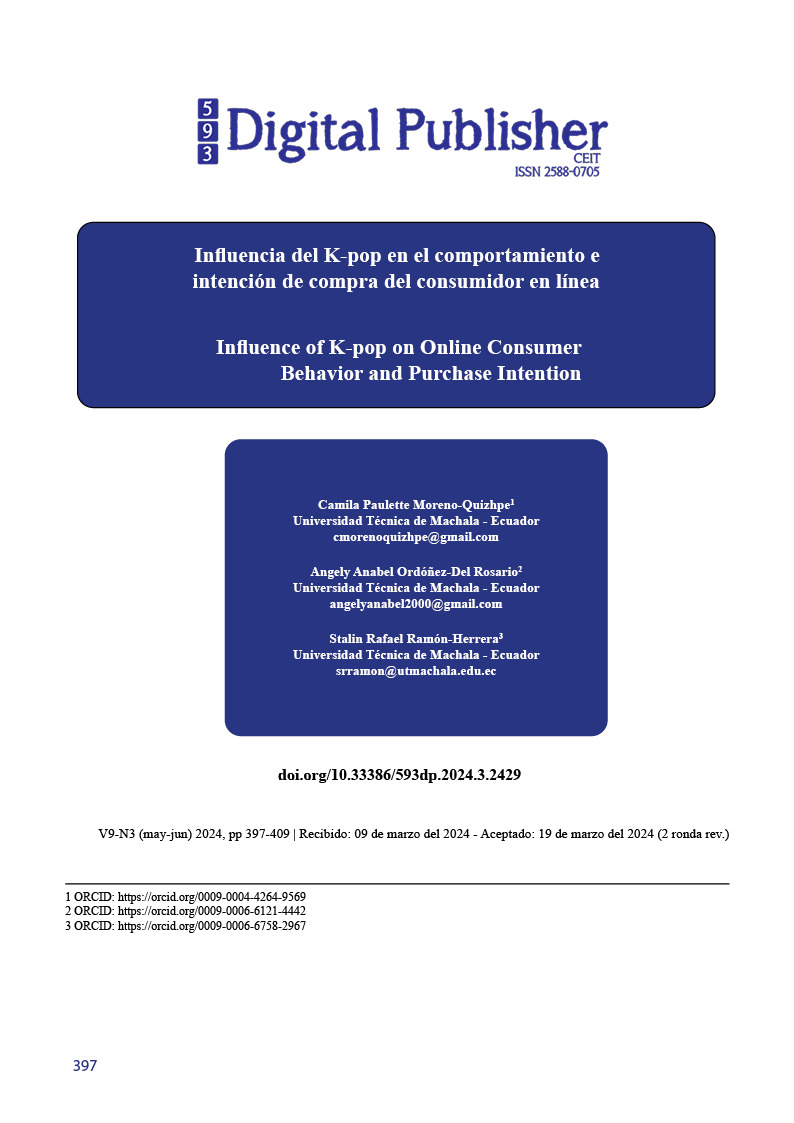Influence of K-pop on Online Consumer Behavior and Purchase Intention
Main Article Content
Abstract
The purpose of the study was to investigate the determinants of consumers' online shopping behavior in the K-pop industry. A conceptual model showing a correlation between variables was proposed. A quantitative methodology was used with an online survey conducted with 50 participants through convenience sampling in the city of Machala, which limited the depth of knowledge about the influences and perceptions of buying in the K-pop music industry. Results analyzed with SmartPLS software revealed that influencer marketing strategies and perceived value positively influence consumers' purchase intentions and behavior, while brand attitude does not positively correlate with consumers' purchase intention. This study underscores the critical influence of marketing strategies and perceived brand equity in a market saturated with diverse music products, highlighting their significant impact on consumers' online purchase behavior and their contribution to the success of digital marketing strategies.
Downloads
Article Details

This work is licensed under a Creative Commons Attribution-NonCommercial-ShareAlike 4.0 International License.
1. Derechos de autor
Las obras que se publican en 593 Digital Publisher CEIT están sujetas a los siguientes términos:
1.1. 593 Digital Publisher CEIT, conserva los derechos patrimoniales (copyright) de las obras publicadas, favorece y permite la reutilización de las mismas bajo la licencia Licencia Creative Commons 4.0 de Reconocimiento-NoComercial-CompartirIgual 4.0, por lo cual se pueden copiar, usar, difundir, transmitir y exponer públicamente, siempre que:
1.1.a. Se cite la autoría y fuente original de su publicación (revista, editorial, URL).
1.1.b. No se usen para fines comerciales u onerosos.
1.1.c. Se mencione la existencia y especificaciones de esta licencia de uso.
References
Jin, D., & Yoon, K. (2016). The social mediascape of transnational Korean pop culture: Hallyu 2.0. new media & society, 18(7), 1277-1292. https://doi.org/10.1177/1461444814554895
Suryawirawan, O. A., Suhermin, S., y Shabrie, W. (2022). Service quality, satisfaction, continuous usage intention, and purchase intention toward freemium applications: the moderating effect of perceived value. Jurnal Ekonomi Bisnis Dan Kewirausahaan (JEBIK), 11(3), 383-404. https://doi.org/10.26418/jebik.v11i3.57483
Abdullah, M., Ali, A., Hashem, A., Faisal, F., Md Salleh, N., y Nor, R. (2023). Research trends, developments, and future perspectives in brand attitude: A bibliometric analysis utilizing the Scopus database (1944–2021). Heliyon, 9(1). https://doi.org/10.1016/j.heliyon.2022.e12765
Ali, A., Ali, A., y Mostapha, N. (2021). The role of country of origin, perceived value, trust, and influencer marketing in determining purchase intention in social commerce. BAU Journal. Society, Culture & Human Behavior, 2(2). https://doi.org/10.54729/2789-8296.1051
Andira, N., y Prasetyo, R. (2023). The impact of e-commerce tactics using K-Pop idol on brand awareness, hedonic shopping motivation towards purchase intention among K-Pop fans. International Journal Of Social Service And Research, 3(4), 956-963. https://doi.org/10.46799/ijssr.v3i4.340
Ardhiyansyah, A., Maharani, D., Sari, S., y Mansur, U. (2021). K-pop marketing tactics that build fanatical behavior. 1st ICEMAC 2020: International Conference on Economics, Management, and Accounting, 4(4), 66-70. https://doi.org/10.11594/nstp.2021.1007
Cooper, T. (2023). Las marcas de lujo adoptan a las estrellas del K-pop como embajadores de la marca. niood: https://niood.com/es/luxury-brands-embrace-k-pop-stars-as-brand-ambassadors/
Dam, T. C. (2020). Influence of brand trust, perceived value on brand preference and purchase intention. The Journal Of Asian Finance, Economics And Business, 7(10), 939–947. https://doi.org/10.13106/jafeb.2020.vol7.no10.939
Desianti, R., & Wardhana, A. (2022). Pengaruh Strategi Pemasaran Dan Kualitas ProdukTerhadap Keputusan. e-Proceeding of Management, 9(3), 1593. https://doi.org/2355-9357
Fauziah, R., y Kusumawati, D. (2015). Fandom k-pop idol dan media sosial (studi deskriptif kualitatif tentang penggunaan media sosial twitter pada hottest indonesia sebagai followers fanbase@ taeckhunid,@ 2pmindohottest dan idol account@ khunnie0624).
Feroza, C., & Misnawati, D. (2020). PENGGUNAAN MEDIA SOSIAL INSTAGRAM PADA AKUN @YHOOPHII_OFFICIAL SEBAGAI MEDIA KOMUNIKASI DENGAN PELANGGAN. Jurnal Inovasi, 14(1), 32-41. https://doi.org/10.33557/ji.v14i1.1397
García, C. E. (2021). La cultura surcoreana y el impacto en los centennials en Latinoamérica. Fundación Universitaria del Área Andina: https://digitk.areandina.edu.co/handle/areandina/3881
Hair , J., Hul, G., Ringle , C., Danks , N., Sarstedt, M., y Ray, S. (2021). Partial least squares structural equation modeling (pls-sem). Using R. Springer, 208. https://doi.org/https://doi.org/10.1007/978-3-030-80519-7
Halima, M. H., Li, Y., Ghani, U., Kiani, A., y Atamba, C. (2021). Impact of online crisis response strategies on online purchase intention: the roles of online brand attitude and brand perceived usefulness. SAGE Open, 11(1). https://doi.org/10.1177/21582440211003872
Ho, H., & Ito, K. (2019). European Journal of Marketing, 53(7), 1355-1377. https://doi.org/0309-0566
Jamal, S., Othman, N., y Nik Muhammad, N. (2011). Tourist perceived value in a community-based homestay visit: an investigation into the functional and experiential aspect of value. Journal Of Vacation Marketing, 17(1), 5-15. https://doi.org/10.1177/1356766710391130
Jayadatta, S., Gangadhar , S., & Cherian, X. (03 de 2023). A study on analysis of customer satisfaction towards digital marketing in present context. ANWESH: International Journal of Management and Information Technology, 8(1), 1-5.
Johnstone, L., y Lindh, C. (2022). Sustainably sustaining (online) fashion consumption: Using influencers to promote sustainable (un)planned behaviour in Europe's millennials. Journal of Retailing and Consumer Services, 64. https://doi.org/10.1016/j.jretconser.2021.102775
Jung, E.-Y. (2015). New wave formations: K-pop idols, social media, and the remaking of the Korean wave. En S. Lee, y A. Nornes, Hallyu 2.0: the Korean wave in the age of social media (pp. 73-89). https://doi.org/10.3998/mpub.7651262
Kacen , J., y Lee, J. (2002). The Influence of Culture on Consumer Impulsive Buying Behavior. Journal of consumer psychology , 12(2), 163-176. https://doi.org/10.1207/S15327663JCP1202_08
Lamberton, C., & Stephen, A. (2016). A Thematic Exploration of Digital, Social Media, and Mobile Marketing: Research Evolution from 2000 to 2015 and an Agenda for Future Inquiry. Journal of marketing, 80(6), 146-172. https://doi.org/10.1509/jm.15.0415
Leung, F., Gu, F., & Palmatier, R. (2022). Online influencer marketing. Journal of the Academy of Marketing Science, 50(2), 226-251. https://doi.org/10.1007/s11747-021-00829-4
Lin, R. H., Jan, C., y Chuang, C.-L. (2019). Influencer marketing on Instagram. International Journal Of Innovation In Management, 7(1), 33-41.
Lou, C., y Yuan, S. (2019). nfluencer marketing: how message value and credibility affect consumer trust of branded content on social media. Journal of InteractiveAdvertising, 58-73. https://doi.org/10.1080/15252019.2018.1533501
Mamun, A., Naznen, F., Yang, Q., Ali, M., y Hashim, N. (2023). Modelling the significance of celebrity endorsement and consumer interest on attitude, purchase intention, and willingness to pay a premium price for green skincare products. Heliyon, 9(6). https://doi.org/10.1016/j.heliyon.2023.e16765
Marchellia, R. I., & Siahaan, C. (2022). EL PAPEL DE LAS REDES SOCIALES INSTAGRAM COMO MEDIO DE COMUNICACIÓN. Journal Riset Komunikasi, 12(1), 65-82. https://doi.org/10.31506/JRK.V13i1.14737
Mehmood, F., Syed, T., y Qaiser, T. (2023). Brand–SMI collaboration in influencer marketing campaigns: a transaction cost economics perspective. Technological Forecasting and Social Change, 192. https://doi.org/10.1016/j.techfore.2023.122580
Mehta, R. (2020). Research paper on digital marketing and it’s effect on purchasing behaviour. International Journal of Recent Research in Commerce Economics and Management (IJRRCEM), 7(1), 1-6.
Rana , A. (2021). Hallyu: the globalization of Korean entertainment industry. International Journal of Research Culture Society, 22, 84-93. https://d1wqtxts1xzle7.cloudfront.net/90141371/MEDIAKONNECT_JAN_2021-libre.pdf?1661282835=&response-content-disposition=inline%3B+filename%3DInternational_Journal_of_Research_Cultur.pdf&Expires=1709009428&Signature=V4l9jMNcBJ7XcHZNgwNPSU-gTcvQdShhm9SQ6A-
Rossiter, J. (2014). ‘Branding’ explained: defining and measuring brand awareness and brand attitude. Journal Of Brand Management, 21, 533-540. https://doi.org/10.1057/bm.2014.33
Saima, y Khan, M. A. (2020). Effect of social media influencer marketing on consumers’ purchase intention and the mediating role of credibility. Journal Of Promotion Management, 27(4), 503-523. https://doi.org/10.1080/10496491.2020.1851847
Sawitri, S., y Alhasin, A. (2022). Online music business: the relationship between perceived benefit, perceived sacrifice, perceived value, and purchase intention. nternational Journal Of Research In Business And Social Science, 11(5), 111-126. https://doi.org/10.20525/ijrbs.v11i5.1900
Thilina, D. (2021). Conceptual review of social influencer marketing on purchase intention; dynamics in fashion retail industry. Sri Lanka Journal of Marketing, 7, 25-52. https://doi.org/10.4038/sljmuok.v7i0.48
Tsarashafa, T., y Qastharin, A. (2021). How fashion influencer contributes to consumers’ purchase intention of university student. Advanced International Journal of Business, Entrepreneurship and SMEs, 3(9), 209-227. https://doi.org/10.35631/AIJBES.39015
Venciute, D., Mackeviciene, I., Kuslys, M., y Fontes, R. (2023). The role of influencer–follower congruence in the relationship between influencer marketing and purchase behaviour. Journal of Retailing and Consumer Services, 75. https://doi.org/10.1016/j.jretconser.2023.103506
Vrontis, D., Makrides, A., Cristófi , M., & Thrassou, A. (2021). Social media influencer marketing: a systematic review. International journal of consumer Studies, 1-28. https://doi.org/10.1111/ijcs.12647
Widayat, W., Azis, N., Sari, H. M., Warsono, W., y Masudin, I. (2023). Determinants of consumer purchasing behavior toward Korean cosmetic products: evidence from Indonesia. Innovative Marketing, 19(2), 129-142. https://doi.org/10.21511/im.19(2).2023.11
Yuniasti, K., & Kusumastuti , F. (2021). Pemanfaatan Akun Twitter @ARMYTEAMIID Sebagai Media Komunikasi Di Kalangan Fans BTS (ARMY). Jurnal Penelitian Pers dan Komunikasi Pembangunan, 25(2), 198-216. https://doi.org/10.46426/jp2kp.v25i2.168
Yusuf, D., Tumbe, A., & Djemly, W. (2022). PENGARUH KUALITAS PRODUK DAN BRAND AMBASSADOR KPOP NCT DREAM TERHADAP. Jurnal EMBA, 10(3), 965-974.
Zainuddin, A., Sulaiman, L., Malek, M., Zamri, M., y Ibrahim, N. (2023). The influence of dgital marketing on consumer behavior in the context of online shopping in the Klang Valley, Malaysia. Information Management and Business Review, 15(3(SI)), 480-489. https://doi.org/10.22610/imbr.v15i3(SI).3504




